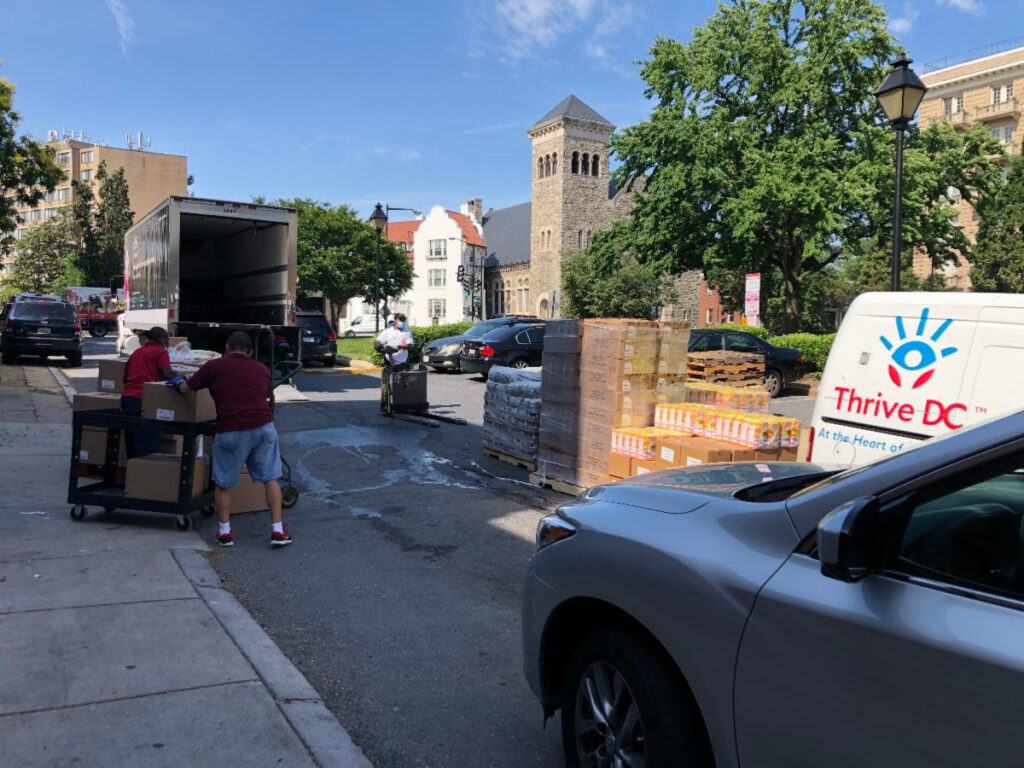
By Bill MacKaye
Loaves and Fishes Management Board Member
Owing to the COVID-19 pandemic, at St. Stephen and the Incarnation, the Sunday Eucharist, coffee hour, classes, meetings, even the weekend Loaves and Fishes sit-down meals are on furlough. That doesn’t mean the church is empty, though. The dining room, where Loaves and Fishes and Thrive DC once served sit-down meals, and the nave of the church, where prayers and sacred song and incense arose, are filled with box after box after box of food.
St. Stephen’s has become a different kind of sacred space, a food warehouse for people striving to feed themselves and their families.
When the pandemic struck full force in early March, four organizations with relationships to St. Stephen’s—Thrive DC, We Are Family, Sanctuary DMV, and our own ministry of Loaves and Fishes—swiftly pivoted their activities to meet the challenges posed by a highly infectious disease and the massive unemployment that resulted from stay-at-home orders. Widespread hunger clearly was the major problem, and as usual the problem was especially intense for people at the bottom of the economic ladder.
Thrive DC
Thrive DC served 60 people needing free groceries at its regular Thursday food pantry on a Thursday in mid-March, said executive director Alicia Horton. One week later the agency encountered more than 200 needing grocery assistance. That was only the beginning.
“We strategized with our food suppliers and devised a plan to increase our purchases to include enough for immigrant families in crisis, our own community of clients that kept growing and other vulnerable groups, for instance returning citizens—men and women coming out of prison in the midst of the pandemic,” said Horton. Folks mostly with no homes, no jobs, and nowhere to turn.
“Since March 23 we have provided groceries and emergency supplies to over 3,000 men, women, and children in the Washington, D.C., area,” Horton said. “Over the last 12 weeks we have distributed well over 70,000 pounds of groceries.” Those 35 tons of food had rolled down the ramp into St. Stephen’s dining room; then they rolled right out again.
Sanctuary DMV
Some of that Thrive food was shared with volunteers of Sanctuary DMV, an all-volunteer collective that “stands in solidarity with immigrants and other marginalized communities,” in the words of Sanctuary DMV volunteer Sandra Moore. Before the pandemic broke out, a principal activity of Sanctuary DMV volunteers was accompanying immigrants to Immigration and Customs Enforcement hearings. With the pandemic shutdown and the explosive growth of unemployment, the sudden greatest need was food.
“An informal effort to serve 200 individuals exploded to a waiting list of 1,200 families in a little over a week,” Moore said. “St. Stephen’s now is the launch pad for ‘pop-up pantries’ that provide food and essentials (diapers, formula, sanitary products, medicines) to last a family two weeks. Every Saturday we use the St. Stephen’s nave to distribute 75 boxes of nonperishables donated by Thrive DC and produce from DC Central Kitchen to volunteers from La Unidad Latina fraternity, who make deliveries to families in the hardest-hit areas.” Sanctuary DMV Food Justice seeks to create mutuality and offer leadership and volunteer opportunities for impacted families so that they are participants and agents of their own freedom. In the three months since it started, Sanctuary DMV Food Justice has provided food and essentials to more than 15,000 people.
We Are Family
Delivering free bags of groceries to senior citizens, many of them frail and lonely, has been a major element of the mission of We Are Family since its beginnings. The coming of the pandemic, however, and the particular threat COVID-19 poses to the old greatly increase the need for its volunteers’ service. Old people who left their residences only cautiously now preferred not to go out at all.
“When St. Stephen’s church building closed, We Are Family first moved its operation outside onto the grounds of St. Stephen’s, assembling grocery bags that also contained coronavirus safety information and coordinating delivery to over 750 seniors in their own homes in March,” said Mark Andersen, co-executive director of the agency. From that point, WAF’s efforts grew steadily more complex, with volunteers regularly calling senior citizens on the agency’s lists, checking on their well-being and taking and filling grocery orders. By June the households WAF was helping had grown to more than 900.
“We began to use the church sanctuary to warehouse emergency supplies of food as well as hard-to-get but essential items like toilet paper, paper towels, masks, gloves and hand sanitizer,” Andersen said. “The flow of food and other supplies in and out of the church building was constant and bustling, helping to meet our seniors’ basic human needs, thus making it practically possible for them to stay safe indoors.”
Loaves and Fishes
Concurrently supplies continued to arrive for Loaves and Fishes, whose sit-down lunches devolved into carryout bag lunches, first sandwiches and bottled water but more recently a more elaborate entrée. And demand grew for the groceries at the Table Church food pantry that Loaves and Fishes hosts on first and third Saturdays. Loaves and Fishes is now in the planning stages of operating its own food pantry on the other Saturdays and will be calling for volunteers from St. Stephen’s congregation shortly.
Support
All four groups would appreciate your financial support. Three agencies accept support at their respective websites:
